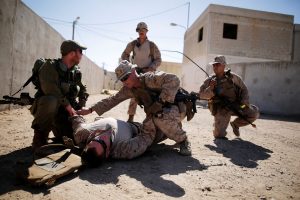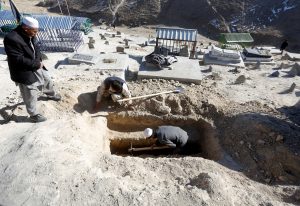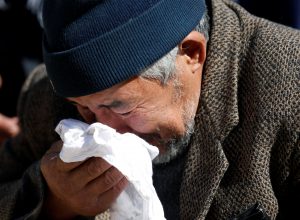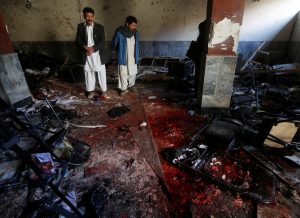
By Kay Johnson and Drazen Jorgic
ISLAMABAD (Reuters) – A global money-laundering watchdog has decided to place Pakistan back on its terrorist financing watchlist, a government official and a diplomat said on Friday, in a likely blow to Pakistan’s economy and its strained relations with the United States.
The move is part of a broader U.S. strategy to pressure Pakistan to cut alleged links to Islamist militants unleashing chaos in neighboring Afghanistan and backing attacks in India.
It comes days after reports that Pakistan had been given a three-month reprieve before being placed on the list, which could hamper banking and hurt foreign investment.
The United States has spent the past week lobbying member countries of the Financial Action Task Force (FATF) to place Pakistan on a so-called grey list of nations that are not doing enough to combat terrorism financing.
Pakistan had launched last-minute efforts to avoid being placed on the list, such as taking over charities linked to a powerful Islamist figure.
But the campaign proved insufficient and the group decided late on Thursday that Pakistan would be put back on the watchlist, a senior Pakistani official and a diplomat with knowledge of the latest FATF discussions told Reuters.
“The decision was taken yesterday. The chair (of FATF) is expected to make a statement some time this afternoon in Paris,” the diplomat said.
Both officials spoke on condition of anonymity.
Pakistan’s foreign ministry spokesman declined to confirm or deny the news at a regular news briefing on Friday, saying the FATF would make an announcement on its website.
“Let the things come out, and then we can comment on the U.S.-Pakistan relationship,” spokesman Mohammad Faisal said.
Pakistan was on the list for three years until 2015.
PAINFUL CONSEQUENCES?
Earlier in the week China, Turkey, and the Gulf Cooperation Council (GCC) were opposing the U.S.-led move against Pakistan but by late on Thursday, both China and the GCC dropped their opposition, the diplomatic source said.
He added that the financial consequences would not kick in until June, which, in theory, could allow Pakistan time to fix financing issues.
“But the odds of that, particularly in an election year, seem slim,” he added.
Pakistani officials and analysts fear being on the FATF list could endanger Pakistan’s handful of remaining banking links to the outside world, causing real financial pain to the economy just as a general election looms.
Under FATF rules one country’s opposition is not enough to prevent a motion from being successful. Britain, France and Germany backed the U.S. move.
Pakistan has sought to head off its inclusion on the list by amending its anti-terrorism laws and by taking over organizations controlled by Hafiz Saeed, a Pakistan-based Islamist accused by the United States and India of being behind 2008 militant attacks on the Indian city of Mumbai in which 166 people were killed.
On Tuesday, Foreign Minister Khawaja Asif tweeted that Pakistan had received a three-month reprieve, adding that it was “grateful to friends who helped”.
U.S. President Donald Trump last month ordered big cuts in security aid to Pakistan over what the United States sees as its failure to crack down on militants.
Pakistan rejects accusations that it sponsors Taliban militants fighting U.S. forces in neighboring Afghanistan and says it is doing all it can to combat militancy.
(Writing by Drazen Jorgic; Editing by Clarence Fernandez, Robert Birsel)
in a likely blow to Pakistan’s economy and its strained relations with the United States.
The move is part of a broader U.S. strategy to pressure Pakistan to cut alleged links to Islamist militants unleashing chaos in neighboring Afghanistan and backing attacks in India.
It comes days after reports that Pakistan had been given a three-month reprieve before being placed on the list, which could hamper banking and hurt foreign investment.
The United States has spent the past week lobbying member countries of the Financial Action Task Force (FATF) to place Pakistan on a so-called grey list of nations that are not doing enough to combat terrorism financing.
Pakistan had launched last-minute efforts to avoid being placed on the list, such as taking over charities linked to a powerful Islamist figure.
But the campaign proved insufficient and the group decided late on Thursday that Pakistan would be put back on the watchlist, a senior Pakistani official and a diplomat with knowledge of the latest FATF discussions told Reuters.
“The decision was taken yesterday. The chair (of FATF) is expected to make a statement some time this afternoon in Paris,” the diplomat said.
Both officials spoke on condition of anonymity.
Pakistan’s foreign ministry spokesman declined to confirm or deny the news at a regular news briefing on Friday, saying the FATF would make an announcement on its website.
“Let the things come out, and then we can comment on the U.S.-Pakistan relationship,” spokesman Mohammad Faisal said.
Pakistan was on the list for three years until 2015.
PAINFUL CONSEQUENCES?
Earlier in the week China, Turkey, and the Gulf Cooperation Council (GCC) were opposing the U.S.-led move against Pakistan but by late on Thursday, both China and the GCC dropped their opposition, the diplomatic source said.
He added that the financial consequences would not kick in until June, which, in theory, could allow Pakistan time to fix financing issues.
“But the odds of that, particularly in an election year, seem slim,” he added.
Pakistani officials and analysts fear being on the FATF list could endanger Pakistan’s handful of remaining banking links to the outside world, causing real financial pain to the economy just as a general election looms.
Under FATF rules one country’s opposition is not enough to prevent a motion from being successful. Britain, France and Germany backed the U.S. move.
Pakistan has sought to head off its inclusion on the list by amending its anti-terrorism laws and by taking over organizations controlled by Hafiz Saeed, a Pakistan-based Islamist accused by the United States and India of being behind 2008 militant attacks on the Indian city of Mumbai in which 166 people were killed.
On Tuesday, Foreign Minister Khawaja Asif tweeted that Pakistan had received a three-month reprieve, adding that it was “grateful to friends who helped”.
U.S. President Donald Trump last month ordered big cuts in security aid to Pakistan over what the United States sees as its failure to crack down on militants.
Pakistan rejects accusations that it sponsors Taliban militants fighting U.S. forces in neighboring Afghanistan and says it is doing all it can to combat militancy.
(Writing by Drazen Jorgic; Editing by Clarence Fernandez, Robert Birsel)













